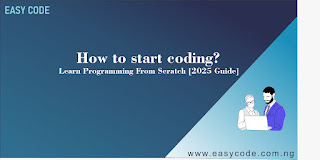Learning programming has become easier in the 21st century, thanks to the development of various blogs, tutorial websites, and the introduction of AI tools. Programming has evolved beyond the era where most programmers were techies — today, programming is for you, me, and everyone.
Many non-beginners believe that AI tools can help them write code from start to finish, so they don’t need programming skills. However, it’s important to note that employers are looking for individuals who can add value to their organizations through critical thinking — not just those who can manipulate AI tools.
That’s why you need to develop a solid understanding of programming and use AI to support you in writing cleaner, more efficient, and faster code. Whether you're a student, entrepreneur, or someone looking to switch careers, learning to code opens doors.
This post will guide you step by step on how to begin your coding journey in 2025.
Step 1:
Start With Why: Most beginners jump into coding with out identifying why they are doing so. You need to have a clear purpose of starting this journey. This reason could be
- A career in tech
- Building mobile app
- Building web app
- automating task
- Analyzing data etc.
Step 2:
Choose ONE Language to Start: After answering the question from step 1 why you need to select a programming language you need to start with. If need a career in:
- Building mobile app : Start with dart and move to flutter framework or start with Java and move to Kotlin or start with JavaScript and move to Reactive Native
- Building web app : Start with HTML, XML, XHTML and CSS for client side development. For sever side you can use PHP, Java Enterprise, Django, Laravel
- automating task: Start with JavaScript and move to framework like Puppeteer, Playwright nodeJs. You can also use python with libraries like requests, BeautifulSoup, and Selenium for web automation, and schedule for scheduling tasks.
- Analyzing data: Learn tools like Excel, powerBi, Tableau, SQL, Python, R-Programming.
Step 3: Pick a Beginner-Friendly Platform: You should choose a platform to learn from their are a lot of free and paid platform you can pick from. Some of the platforms are listed below:
- JavaTPoint (Free)
- W3School (Free)
- SimpliLearn (Free and Paid)
- Easycode.com.ng (Free find tons of programming solution)
- Coursera (Paid)
- BootCamp (Free and Paid)
- CodeAcademy (Free and Paid)
- Youtube channels (NetNinja, Oracoder NextGen, etc.)
Step 4: Learn by Building Small Projects: Developing simple project is a good way to start. Don't start with a big complex project. Start with something little that can be completed within a short time frame. Below is a list of project topic you can start with:
- A
calculator
- A
to-do list app
- A
simple website
- A
weather app using an API
Step 5: Version Control Early (Git/GitHub): Learn how to use version control system early. It is a good practice to upload your project no matter how little to GitHub and also contribute on open source project. That will help you improve your skill.
Step 6: Join a Community: Learning alone can be hard and sometimes you need a team or someone you can frequently ask questions and discuss your progress or new idea with. Join communities like:
- Reddit
(r/learnprogramming)
- Discord
servers
- Twitter/X
tech circles
- Local coding bootcamps or meetups
Step 7: Be Consistent, Not Perfect: You need to be consistent and always put a smiling face when you see redlines. Yes Bugs, you will have a lot of bugs and you will feel like quitting at some point. Don't quit search for similar error message and learn how the issue was resolve from different blogs. You can also use AI tools to search for solution to error message. Code for at-least 1 hour daily and within a short time you will become perfect.
HAPPY CODING AND HAVE FUN

